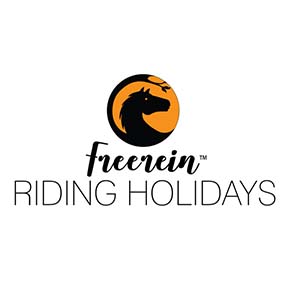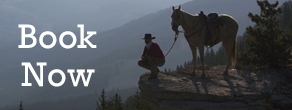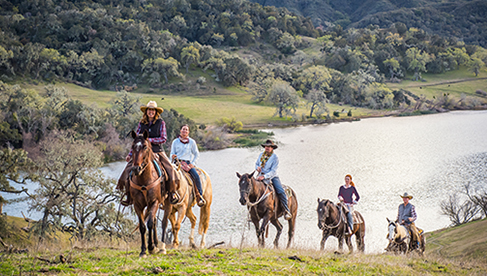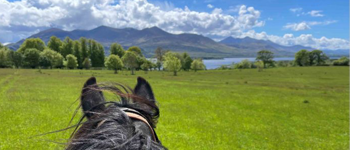A Cowgirl in South Dakota- Equine Career on a Working Ranch
A modern cowgirl finds a new life with an equine career at a working ranch in South Dakota
Jenn Zeller, otherwise known online as The South Dakota Cowgirl, was rodeoing, riding and training horses in Texas when she got a job offer to train and start Quarter horse colts at The DX Ranch, a working cattle and Quarter horse ranch located in the grassy plains of Central South Dakota.
Growing up outside of Forth Worth, Texas, Jenn got her first horse when she was twelve-years-old and later spent a lot of time at rodeos. Jenn topped out at 75 rodeos per year in her junior and senior year of high school, garnering a scholarship to ride in college.
Running barrels and roping gave Jenn a good foundation for life on the ranch, but didn’t totally prepare her for many of the challenges she’d face living on a vast working ranch in the Dakotas.

I met Jenn through Twitter and since I’m always interested in learning about people who have interesting equine careers and horse ranch jobs, I gave her a call. Here’s the interview so that you can decide if life on a working ranch is for you.
Darley Newman: What made you decide to leave your life in Texas and move to the vast grasslands of South Dakota?
Jenn: I have always wanted to live on a ranch and love wide-open spaces. My family reminded me of that when I got the opportunity. But more than that, it was a chance to stretch my abilities, live in a new state, learn new things, and raise horses. Breeding horses is something I'd always wanted to do but never thought I'd get the opportunity. I think to add to that, I am also able to use my marketing experience and business degree while still doing what I'm passionate about, which is riding, training horses, and being a cowgirl.
I love having any excuse to wear a cowboy hat, and now I can don one daily and fit right in!
Darley Newman: What are the challenges of life on a remote ranch and careers with horses?
I think the hardest part of living where we do is that it's far away from everything- horse events included.
My closest neighbor is 3 miles away. I'm 10 miles one-way from the mailbox, 40 miles one-way from the post office and a "grocery store" if you want to call it that. We're 65 miles one-way from the Wal-mart. So there is definitely some planning to do.
I go to the store every 3-5 weeks because it is a day-trip when I do. And I don't like to be away from home! If you run out of something, you don't just run to the store and get it.
Fortunately there are family members that work in town, so you are able to get some things if you run out, and UPS delivers to our front door. If we can get it on the internet, I can have it! I make great use of our Amazon.com Prime account.

We see our UPS driver so much we give him home-raised beef and cookies at Christmas!
Having grown up in the city with a plethora of choices of things to do, barrel races to go to, and friends around for happy hours on the weekends, it was hard, at first, to just stay at the house. That said, there is something about the land, and the people here that make staying in so relaxing.
It's very nice to be out of the rat race and just be able to be yourself. Plus, I'm doing what I really want to do which is ride horses. I'm in a place where I am constantly pushed and encouraged to be the best person I can be. I think ranching does that.
Darley Newman: That does sound nice. I want to be your mailman! What is day-to-day life like on the ranch?
Jenn: You really never know what to expect on a daily basis! Winter is probably the time when you can get into a routine and stick to it. It's feed hay, cake cows, open water, not necessarily in that order.
Spring brings calving season and the thaw, so it's time to get the colts in and start spending time in the barn. Then there's the occasional snow storm, equipment break-downs, a cow will have trouble calving, or might need some extra help taking her calf- so there isn't a routine, other than to ride through the cow herd and make sure no one is having trouble.
This year I hope to tag all the calves as they're born instead of doing it at branding, so that will add something else to do daily. During Spring and into Summer we start branding season. It's not unusual to go to 5-6 brandings in a 10 day period during this time.
Lots of riding to gather cows, sorting cows, and roping calves. It's a good time to get your colts some work if they're ready!

Summer brings haying, and ranch interns and lots of barrel races and riding. There's usually a two or three week stint at a time, when all we do is ride for 10 hours a day. But then some machinery will break, or the cows will find a hole in the fence or we'll take a day off to swim in the Missouri river. I try to take time to garden and keep the yard pretty too.
Darley Newman: You start a lot of colts. What is your horse training philosophy?
Jenn: In a nutshell- make the right thing easy and the wrong thing difficult. I have grown as a horseman so much since moving here. I trained horses for a living before I got here, but I have continued to grow and learn and have worked on myself so much and my horses are happier with me for it.
A colt with a good foundation is a lot like a kid with good parents, they're a lot less likely to go astray (or learn to buck you off).

So we do a lot of ground-work, teaching the colts to be feather soft at the end of the lead rope, hold a round shape on their own, back at the slightest cue, and learn to disengage their hips. All of those things will carry over to that first ride. We reward the slightest try, and in the end our colts reward us by trying really hard to find the "right" answer. Typically a first ride is done in a halter, and lead rope and we keep everything very relaxed.
We study the work of Ray Hunt, Buck Brannaman, Curt Pate, and Martin Black. We read and watch all different horseman, because we believe you can learn something from everyone, even if it is what not to do!
Darley Newman: What’s the number one tip you would give to readers who want to visit a working ranch and gain some cattle work experience?
Jenn: Be prepared to ride- a lot!
Be teachable. Some places that might not be important, but if you want to gain the experience, you need to be a good listener.
Every ranch has different cattle working techniques. So if you've been on a working ranch vacation before it's a good idea to listen to and get a feel for how they want things done. We like to use low-stress cattle handling techniques, and even here in this area there are people that don't do things this way.
A stress-free cow is a happy cow! It's about being aware of how your actions, and your posture, and your *energy* affect the cow and those around you.
Darley Newman: There aren’t that many multi-generational ranches in the United States anymore, so the fact that the Ducheneaux Ranch is being run by third generation ranchers is special. What do you see for the future of the ranch? Will it be passed down to the next generation?
Jenn: There is no doubt that it will stay in the family! Ranching is addictive.
While it can be some of the hardest work you'll ever do, and your payday is only once per year, there is nothing more rewarding you can do with your life than ranch. You get to be a steward of the land, feed Americans and yourself.

Specifically, I see the horse program expanding in the next 10 years- from not only interns, horse camps, and vacations but to possibly helping under-priveliged children or even doing therapeutic riding. We've plans to add a big riding barn as well as camping cabins in the future.
I believe that at some point the horse program and the cattle program may become two separate entities. We'll never be a horse-free ranch like so many across the US are now. Horses are to this ranch, like stoplights are to a city street- we'll never be without them. Our breeding program has history that we'd like to pass on to the next generation of Ducheneaux Ranchers!




